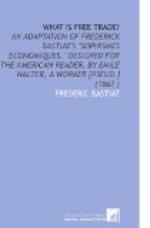According to the first system, riches are the result of labor. They increase in the same ratio as the result does to the effort. Absolute perfection, of which God is the type, consists in the infinite distance between these two terms in this relation, viz., effort none, result infinite.
The second system maintains that it is the effort itself which forms the measure of, and constitutes, our riches. Progression is the increase of the proportion of the effect to the result. Its ideal extreme may be represented by the eternal and fruitless efforts of Sisyphus.[A]
[Footnote A: We will therefore beg the reader to allow us in future, for the sake of conciseness, to designate this system under the term of Sisyphism, from Sisyphus, who, in punishment of his crimes, was compelled to roll a stone up hill, which fell to the bottom as fast as he rolled it to the top, so that his labor was interminable as well as fruitless.]
The first system tends naturally to the encouragement of everything which diminishes difficulties, and augments production—as powerful machinery, which adds to the strength of man; the exchange of produce, which allows us to profit by the various natural agents distributed in different degrees over the surface of our globe; the intellect which discovers, the experience which proves, and the emulation which excites.
The second as logically inclines to everything which can augment the difficulty and diminish the product; as, privileges, monopolies, restrictions, prohibition, suppression of machinery, sterility, &c.
It is well to mark here that the universal practice of men is always guided by the principle of the first system. Every workman, whether agriculturist, manufacturer, merchant, soldier, writer or philosopher, devotes the strength of his intellect to do better, to do more quickly, more economically—in a word, to do more with less.
The opposite doctrine is in use with theorists, essayists, statesmen, ministers, men whose business is to make experiments upon society. And even of these we may observe, that in what personally concerns themselves, they act, like everybody else, upon the principle of obtaining from their labor the greatest possible quantity of useful results.
It may be supposed that I exaggerate, and that there are no true Sisyphists.
I grant that in practice the principle is not pushed to its extreme consequences. And this must always be the case when one starts upon a wrong principle, because the absurd and injurious results to which it leads, cannot but check it in its progress. For this reason, practical industry never can admit of Sisyphism. The error is too quickly followed by its punishment to remain concealed. But in the speculative industry of theorists and statesmen, a false principle may be for a long time followed up, before the complication of its consequences, only half understood, can prove its falsity; and even when all is revealed, the opposite principle is acted upon, self is contradicted, and justification sought, in the incomparably absurd modern axiom, that in political economy there is no principle universally true.




